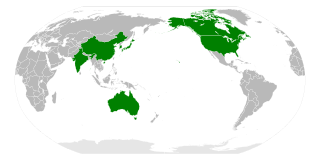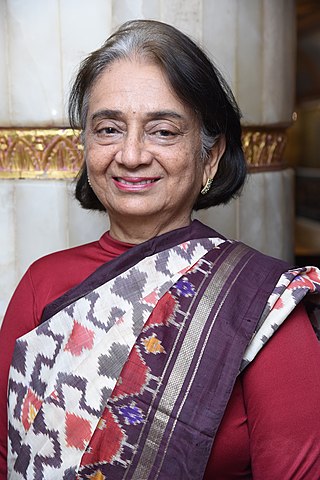
The United Nations Environment Programme (UNEP) is responsible for coordinating responses to environmental issues within the United Nations system. It was established by Maurice Strong, its first director, after the United Nations Conference on the Human Environment in Stockholm in June 1972. Its mandate is to provide leadership, deliver science and develop solutions on a wide range of issues, including climate change, the management of marine and terrestrial ecosystems, and green economic development. The organization also develops international environmental agreements; publishes and promotes environmental science and helps national governments achieve environmental targets.

The United Nations Institute for Training and Research (UNITAR) is a dedicated training arm of the United Nations system. UNITAR provides training and capacity development activities to assist mainly developing countries with special attention to Least Developed Countries (LDCs), Small Island Developing States (SIDS) and other groups and communities who are most vulnerable, including those in conflict situations.

The French Development Agency is a public financial institution that implements the policy defined by the French Government. It works to fight poverty and promote sustainable development. This public institution is active in Africa, Asia, the Middle East, Latin America, the Caribbean and the French overseas territories, where it finances and supports projects that improve living conditions for populations, promote economic growth and protect the planet.

The Asia-Pacific Partnership on Clean Development and Climate, also known as APP, was an international, voluntary, public-private partnership among Australia, Canada, India, Japan, the People's Republic of China, South Korea, and the United States announced July 28, 2005 at an Association of South East Asian Nations (ASEAN) Regional Forum meeting and launched on January 12, 2006, at the Partnership's inaugural Ministerial meeting in Sydney. As of 5 April 2011, the Partnership formally concluded although a number of individual projects continue. The conclusion of the APP and cancellation of many of its projects attracted almost no media comment.

The Joint Research Centre (JRC) is the European Commission's science and knowledge service which employs scientists to carry out research in order to provide independent scientific advice and support to European Union (EU) policy.
The Institute for Defense Analyses (IDA) is an American non-profit corporation that administers three federally funded research and development centers (FFRDCs) – the Systems and Analyses Center (SAC), the Science and Technology Policy Institute (STPI), and the Center for Communications and Computing (C&C) – to assist the United States government in addressing national security issues, particularly those requiring scientific and technical expertise. It is headquartered in Alexandria, Virginia.

The Ecologist is a British environmental journal, then magazine, that was published from 1970 to 2009. Founded by Edward Goldsmith, it addressed a wide range of environmental subjects and promoted an ecological systems thinking approach through its news stories, investigations and opinion articles. The Ecologist encouraged its readers to tackle global issues on a local scale. After cessation of its print edition in July 2009, The Ecologist continued as an online magazine. In mid-2012, it merged with Resurgence magazine, edited by Satish Kumar, with the first issue of the new Resurgence & Ecologist appearing in print in September 2012. The Ecologist was based in London.

The Africa Report is a Paris-based English-language quarterly magazine that focuses on African politics and economics.
The International Institute for Environment and Development (IIED) is an independent policy research institute whose stated mission is to "build a fairer, more sustainable world, using evidence, action and influence in partnership with others." Its director is Dr Tom Mitchell.
This article includes information about environmental groups and resourcesthat serve K–12 schools in the United States and internationally. The entries in this article are for broad-scope organizations that serve at least one state or similar regions.

The Energy and Resources Institute (TERI) is a research institute in New Delhi that specializes in the fields of energy, environment and sustainable development. Established in 1974, it was formerly known as the Tata Energy Research Institute. As the scope of its activities widened, it was renamed The Energy and Resources Institute in 2003.
Environmental governance (EG) consist of a system of laws, norms, rules, policies and practices that dictate how the board members of an environment related regulatory body should manage and oversee the affairs of any environment related regulatory body which is responsible for ensuring sustainability (sustainable development) and manage all human activities—political, social and economic. Environmental governance includes government, business and civil society, and emphasizes whole system management. To capture this diverse range of elements, environmental governance often employs alternative systems of governance, for example watershed-based management.

The Arctic policy of the United States is the foreign policy of the United States in regard to the Arctic region. In addition, the United States' domestic policy toward Alaska is part of its Arctic policy.

Jyoti Kirit Parikh is the current Executive Director of Integrated Research and Action for Development (IRADe). She was a Member of the Prime Minister’s Council on Climate Change –India and is a recipient of Nobel Peace Prize awarded To IPCC authors in 2007. She was a Senior Professor at Indira Gandhi Institute of Development Research (IGIDR), Mumbai. She also worked at the International Institute for Applied Systems Analysis (IIASA), Austria and served as a senior energy consultant at the National Institution for Transforming India (1978–80). She was a visiting professor at the Institute of Advanced Studies (IAS) of UNU, Tokyo (1995–96). She was the Acting Director of IGIDR for 1997-98. She has experience for nearly thirty years on energy and environment problems of the developing countries.
Global South Development Magazine (GSDM) is an online magazine dedicated to international development issues. The magazine is inspired by the idea of citizen journalism and primarily covers developmental issues of developing countries. From 2010 to 2015, GSDM was a quarterly magazine published by a Finnish non-profit development media organisation Silver Lining Creation. As of 2018, the magazine is published by Helsinki-based media organization, Global South Media Action, which also runs the online education platform, UniDevv.

The Sustainable Development Goals or Global Goals are a collection of seventeen interlinked objectives designed to serve as a "shared blueprint for peace and prosperity for people and the planet, now and into the future." The SDGs are no poverty; zero hunger; good health and well-being; quality education; gender equality; clean water and sanitation; affordable and clean energy; decent work and economic growth; industry, innovation and infrastructure; reduced inequalities; sustainable cities and communities; responsible consumption and production; climate action; life below water; life on land; peace, justice, and strong institutions; and partnerships for the goals. The SDGs emphasize the interconnected environmental, social and economic aspects of sustainable development by putting sustainability at their center.
Neva Goodwin Rockefeller, known professionally as Neva Goodwin, is co-director of the Global Development And Environment Institute (GDAE) at Tufts University, where she is a research associate at the Fletcher School of Law and Diplomacy and director of the Social Science Library: Frontier Thinking in Sustainable Development and Human Well-Being.
The Hydropower Sustainability Assessment Protocol(HSAP) is a global framework for assessing the sustainability of hydropower projects. The Protocol defines good and best practice at each stage of the life-cycle of a hydropower project across twenty-four environmental, social, technical and economic topics.










